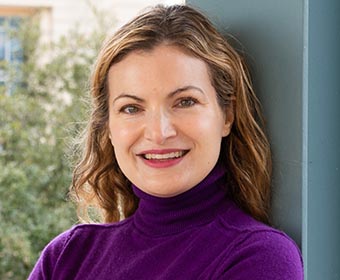
Professor Qutub will introduce the latest advancements in science and technology that illustrate how daily behaviors influence the ability of brain cells to repair and regenerate.
(March 22, 2019) -- To celebrate 50 years as San Antonio’s urban serving university and to thank San Antonio for its support and commitment to higher education, UTSA is presenting its 50th Anniversary Scholars Speaker Series throughout 2019, featuring experts on a broad range of contemporary issues that impact society.
On Tuesday, March 26, the speaker series will continue with Amina Qutub, associate professor of biomedical engineering. Her talk, How Daily Habits Can Impact Brain Health, will introduce the latest advances in science and technology to illustrate how daily behaviors influence the ability of brain cells to repair and regenerate, enabling a future that optimizes brain health. The event is free and open to the public.
>> Learn more about this Scholars Speaker Series.
Qutub’s research aims to understand and improve health by interpreting human cells’ communication during process growth and regeneration. Her research team is developing tightly coupled experimental-computational methods to identify fundamental mechanisms of cell communication in the bone marrow and brain. That work has clinical applications to hematological cancers and neurodegenerative disease treatments.
"A critical first step in optimizing brain health is reproducibly assessing it,” said Qutub. “We launched the Quantu Project, a large-scale human subjects study that tracks daily habits and behaviors like sleep, and asks whether these habits influence the ability of new brain cells to form. To study brain cells in a way that is specific to an individual volunteer without harming them, we model how stem cells reprogrammed from blood form networks of neurons."
Qutub received her Ph.D. in Bioengineering from the University of California, Berkeley and University of California, San Francisco. She completed postdoctoral training in Biomedical Engineering at Johns Hopkins University School of Medicine then served on the faculty at Rice University. She joined the UTSA faculty in fall 2018.
She is currently a member of the joint UTSA/UT Health San Antonio Graduate Group in Biomedical Engineering and the UTSA Brain Health Consortium. She is also the co-founder of DiBS, an adaptive data visualization startup.
>> Discover groundbreaking research happening at the UTSA Brain Health Consortium.
How Daily Habits Can Impact Brain Health is scheduled to begin at 6:30 p.m. on Tuesday, Mar. 26 at The McNay Art Museum, 6000 N. New Braunfels Ave., San Antonio, Texas 78209. Doors will open and a cash bar will be available at 6 p.m. Attendees will have an opportunity to meet the speaker following the presentation at 7:15 p.m.
View the yearlong calendar for UTSA’s 50th Anniversary Scholar Speaker Series.
Celebrate UTSA’s 50th Anniversary and share social media posts about the 50th using the hashtag #UTSA50.
Learn more about the UTSA Department of Biomedical Engineering.
Connect with UTSA online at Facebook, Twitter, YouTube, Instagram and LinkedIn.
UTSA Today is produced by University Communications and Marketing, the official news source of The University of Texas at San Antonio. Send your feedback to news@utsa.edu. Keep up-to-date on UTSA news by visiting UTSA Today. Connect with UTSA online at Facebook, Twitter, Youtube and Instagram.
Covidence is a systematic & scoping review tool used to streamline the process of screening and reviewing articles. Using this software, research teams can easily import studies, perform automatic deduplication, and extract data using templates. This workshop will show attendees how to start a review in Covidence, add collaborators, and get started on screening.
Virtual (Zoom)In this workshop, attendees will be introduced to Pandas, a Python tool for working with data easily. It makes it simple to organize and analyze information when data is organized and categorized, like spreadsheets or tables.
Group Spot B, John Peace LibraryEach fall and spring semester, students convene at the Main Campus at UTSA with booths, ideas and prototypes. A crowd of judges, local organizations, students, faculty and sponsors walk around and talk to the students about their projects and ask questions. Students get the real-life experience of "pitching" their project with hopes of getting funding or support to move to the next level.
UTSA Convocation Center, Main CampusJoin the doctoral candidates for the Doctoral Conferreal Ceremony and celebrate their accomplishments.
Arts Building Recital Hall, Main CampusCelebrate the graduates from the Carlos Alvarez College of Business, College of Education and Human Development, Margie and Bill Klesse College of Engineering and Integrated Design and University College.
AlamodomeCelebrate the graduates from the College for Health, Community and Policy, College of Liberal and Fine Arts and College of Sciences.
AlamodomeThe University of Texas at San Antonio is dedicated to the advancement of knowledge through research and discovery, teaching and learning, community engagement and public service. As an institution of access and excellence, UTSA embraces multicultural traditions and serves as a center for intellectual and creative resources as well as a catalyst for socioeconomic development and the commercialization of intellectual property - for Texas, the nation and the world.
To be a premier public research university, providing access to educational excellence and preparing citizen leaders for the global environment.
We encourage an environment of dialogue and discovery, where integrity, excellence, respect, collaboration and innovation are fostered.